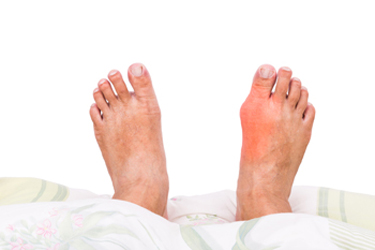 If you notice a bony protrusion that may look like a permanent deformity on the side of your big toe, you may have what is known as a bunion. It may develop as a result of wearing shoes that do not have adequate room for the toes to move freely in, or possibly from a genetic trait. Some of the symptoms that are associated with this condition may be tenderness and swelling, in addition to burning or tingling sensations. If having this ailment interferes with wearing shoes and completing daily activities, many patients may choose to undergo surgery for permanent removal of the bunion. For less severe bunions, orthotics may be prescribed which may provide mild relief. If properly fitting shoes and socks are worn, painful and uncomfortable bunions may possibly be prevented. If you are affected by bunions, it is advised to speak to a podiatrist who can properly diagnosis and offer correct treatment techniques.
If you notice a bony protrusion that may look like a permanent deformity on the side of your big toe, you may have what is known as a bunion. It may develop as a result of wearing shoes that do not have adequate room for the toes to move freely in, or possibly from a genetic trait. Some of the symptoms that are associated with this condition may be tenderness and swelling, in addition to burning or tingling sensations. If having this ailment interferes with wearing shoes and completing daily activities, many patients may choose to undergo surgery for permanent removal of the bunion. For less severe bunions, orthotics may be prescribed which may provide mild relief. If properly fitting shoes and socks are worn, painful and uncomfortable bunions may possibly be prevented. If you are affected by bunions, it is advised to speak to a podiatrist who can properly diagnosis and offer correct treatment techniques.
If you are suffering from bunions, contact Jim Maxka, DPM of South Penn Foot & Ankle Associates. Our doctor can provide the care you need to keep you pain-free and on your feet.
What Is a Bunion?
A bunion is formed of swollen tissue or an enlargement of boney growth, usually located at the base joint of the toe that connects to the foot. The swelling occurs due to the bones in the big toe shifting inward, which impacts the other toes of the foot. This causes the area around the base of the big toe to become inflamed and painful.
Why Do Bunions Form?
Genetics – Susceptibility to bunions are often hereditary
Stress on the feet – Poorly fitted and uncomfortable footwear that places stress on feet, such as heels, can worsen existing bunions
How Are Bunions Diagnosed?
Doctors often perform two tests – blood tests and x-rays – when trying to diagnose bunions, especially in the early stages of development. Blood tests help determine if the foot pain is being caused by something else, such as arthritis, while x-rays provide a clear picture of your bone structure to your doctor.
How Are Bunions Treated?
- Refrain from wearing heels or similar shoes that cause discomfort
- Select wider shoes that can provide more comfort and reduce pain
- Anti-inflammatory and pain management drugs
- Orthotics or foot inserts
- Surgery
If you have any questions, please feel free to contact our office located in Hanover, PA . We offer the newest diagnostic and treatment technologies for all your foot care needs.
